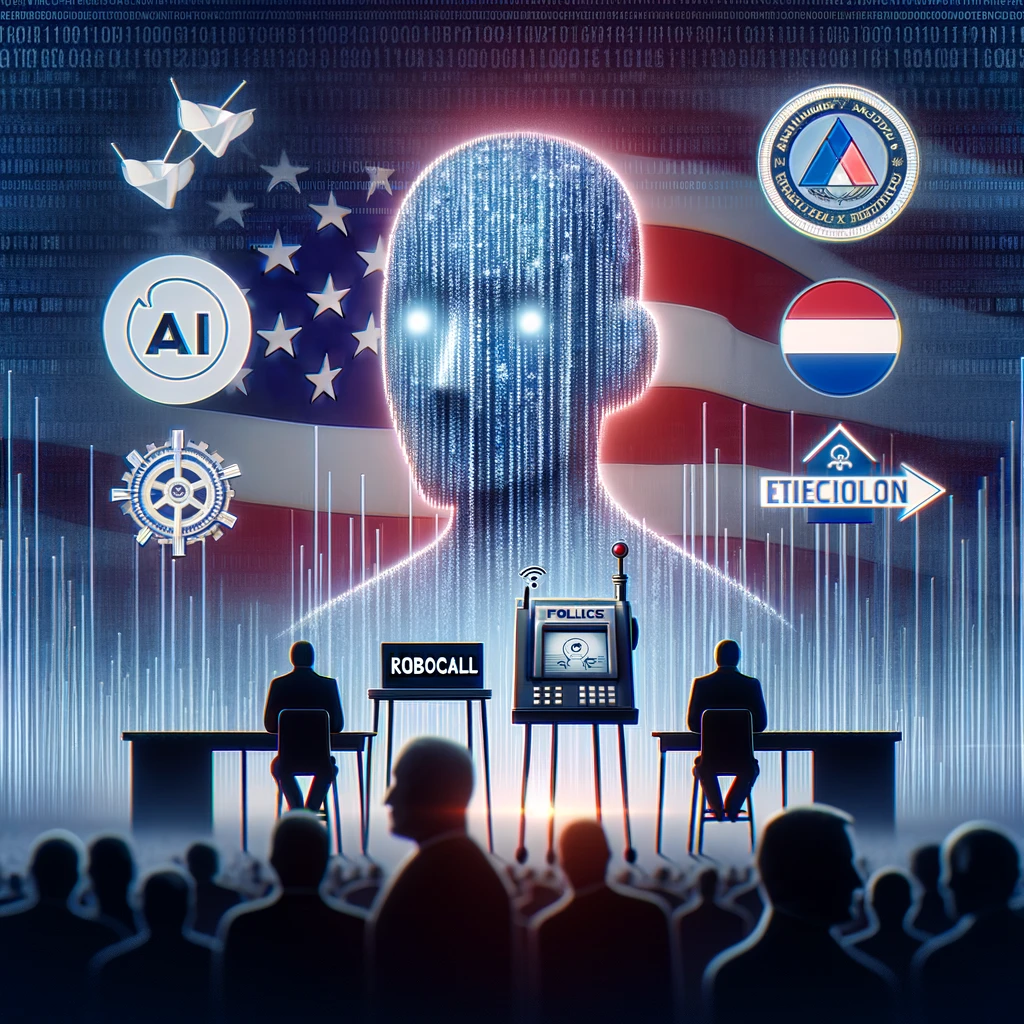The AI Mirage: Unraveling the New Hampshire Robocall Scandal and Its Implications for Global Democracy

Navigating the Ethical Labyrinth: AI's Role in Modern Politics and its Impact on Democracy
- How is AI technology being misused in political scenarios like the New Hampshire robocall incident, and what are the potential risks to democratic processes?
- What are the ethical implications and challenges of integrating AI into political campaigns and elections, especially considering global perspectives?
- What steps or regulations are needed to balance the use of AI in politics with the need to preserve democratic integrity and prevent misinformation?
In a world increasingly intertwined with technological advancements, the recent incident in New Hampshire, where an AI-generated robocall impersonating President Joe Biden attempted to suppress votes, stands as a stark reminder of the challenges democracies face in the digital age. As detailed in Ali Swenson’s report for The Seattle Times, this event not only reflects the growing sophistication of AI in mimicking human voices but also the potential misuse of such technologies in political landscapes.
A Deepfake Dilemma
The robocall in question, which advised voters to “save their vote for the November election,” used AI to replicate Biden’s distinct vocal patterns, including his characteristic phrase, “What a bunch of malarkey.” This incident, currently under investigation by New Hampshire Attorney General John Formella, poses significant questions about the integrity of elections and the role of AI in them. While the robocall was quickly identified as a scam, the ease and convincing nature of the AI-generated voice exemplify the risks associated with deepfake technology.
Global Perspectives on AI in Politics
From a global viewpoint, the use of AI in politics is not limited to the United States. In Europe, where data privacy and digital ethics are hotly debated topics, such incidents serve as a cautionary tale. European regulators have been proactive in implementing stringent data protection laws, like the General Data Protection Regulation (GDPR), but the political misuse of AI presents new challenges that extend beyond personal data protection. As my blog discussed in “Silicon Valley’s AI Gamble: Unseating Biden in the 2024 Election,” the intertwining of AI with political processes is a global concern, requiring international cooperation and regulatory frameworks.
The Ethics of AI in Elections
The ethical implications of AI use in elections are profound. While AI can enhance voter engagement and streamline electoral processes, its potential for misinformation and voter manipulation is a double-edged sword. The New Hampshire incident underlines the urgent need for ethical guidelines and regulations to govern AI’s role in political campaigns and electoral processes.
Differing Viewpoints and Future Scenarios
Opinions on AI’s role in politics vary. Some view it as an inevitable evolution of campaign strategies in the digital era, while others see it as a threat to the foundations of democratic societies. Looking ahead, it’s plausible to envision a future where AI becomes a standard tool in political campaigns, but this future also demands robust safeguards against misinformation and misuse.
Towards a Regulated AI Future
As AI continues to evolve, governments and international bodies must grapple with its implications for democracy. The incident in New Hampshire could serve as a catalyst for more stringent regulations on AI in political campaigns, not just in the United States but globally. The European Union, known for its proactive stance on digital issues, may lead the way in establishing frameworks that balance the benefits of AI with the need to preserve democratic integrity.
For those intrigued by the interplay between AI and politics and looking to delve deeper into the regulatory landscape of this evolving technology, our blog offers a wealth of related insights. Don’t miss our series of articles that explore various facets of AI regulation and its global implications:
- Navigating the Maze of AI Regulation: The EU’s Landmark Journey and Silicon Valley’s Influence – Uncover the intricate journey of the European Union as it sets the course for AI regulation, and how Silicon Valley’s tech giants are responding to these groundbreaking changes.
- AI Regulation in the EU: Navigating New Frontiers in Technology Governance – Dive into the specifics of the EU’s regulatory approach to AI, understanding the nuances and challenges of governing a technology that’s reshaping our world.
- Navigating the Future of AI: An Exclusive Interview on the EU’s Landmark Regulation – Gain insights from industry experts in an exclusive interview that sheds light on the future trajectory of AI regulation in the EU.
- AI’s Tipping Point: Riding the Crest of Innovation into 2024 – Explore how the advancements in AI are propelling us into a new era of technological innovation, and what this means as we approach the year 2024.
Each of these articles offers a unique perspective on the complexities and advancements in AI regulation. Whether you’re a tech enthusiast, policy maker, or simply curious about the future of AI, these reads are sure to enrich your understanding and spark further interest in the topic.
Navigating the AI Political Landscape
The robocall incident in New Hampshire is a microcosm of a larger, global challenge. As we navigate this new era of AI-driven politics, the need for informed debate, ethical guidelines, and stringent regulations has never been more critical. The balance between harnessing AI’s potential and protecting democratic processes will define the political landscape of the future, both in the United States and around the world.




